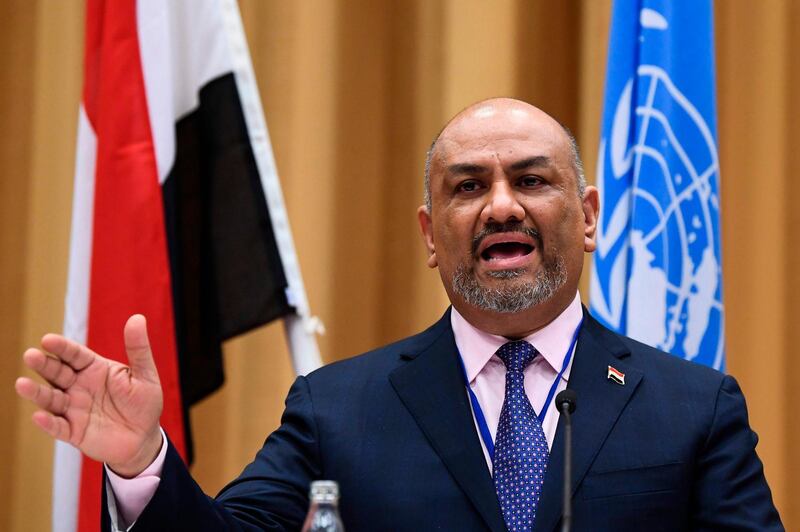Yemen’s foreign minister, Khaled Al Yamani, urged the UN on Sunday to make Houthi rebels respect a ceasefire struck at peace talks in Sweden, amid deadly clashes in the port city of Hodeidah.
"We urge you to be tough when dealing with the Houthis to ensure their commitment to the agreement in Sweden, which includes a ceasefire and the full withdrawal of their militias from Hodeidah's three ports and city," Mr Al Yamani said in a letter, seen by The National, to UN envoy Martin Griffiths.
The UN-led talks ended on Thursday with a series of agreements that, if implemented, would alleviate Yemen’s humanitarian crisis and could pave the way for a negotiated peace.
_______________
Read more:
Observers fear Hodeidah deal may not lead to end of Yemen's war
_______________
Mr Al Yamani warned that the Houthis should not be given the opportunity to exploit the period between the declaration of the ceasefire and the withdrawal of forces from Hodeidah.
“They will continue to commit war crimes by looting and destroying the city,” Mr Al Yamani wrote.
The truce in Hodeidah was due to be followed by the withdrawal within days of fighters on both sides. The ceasefire accord is regarded as the most significant step towards ending the devastating conflict that has raged in Yemen since 2015.
Mr Al Yamani confirmed the ceasefire will start on Tuesday, adding that the government was cautious over what was agreed in Sweden.
“We are wary of the Houthis' commitment to the Stockholm agreement. We will assess the rebels' actions during the next few weeks,” Mr Al Yamani said.
Unresolved issues include the reopening of Sanaa’s airport, a political framework for the future and the country’s economic crisis.
Previous attempts to reopen the rebel-held airport in the Yemeni capital faltered because the Houthis rejected a government demand to inspect all flights from Sanaa at the airports it controls in Aden and Sayoun.
“We were surprised that you criticised our proposal on Sanaa’s airport, although our request was rejected by the rebels,” Mr Al Yamani wrote to Mr Griffiths.
The foreign minister stressed that the UN envoy should have been tougher with the Houthis on the issue of the airport.
“Instead the envoy deliberately did not object to the Houthis' refusal,” Mr Al Yamani said.
Meanwhile, Mr Griffiths said he “expects the two parties to respect their obligations as per the text and spirit of the Stockholm Agreement and to engage in the immediate implementation of its provisions”.
He tweeted that the UN was working with Yemen’s warring sides to ensure the accord on Hodeidah reached on Thursday was “implemented timely and properly”.
UN chief Antonio Guterres warned that “much worse” lay in store for Yemen in 2019 unless the two sides strike a peace deal and head off a humanitarian crisis.






